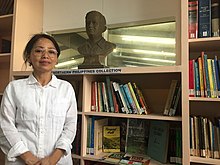Neferti Tadiar
Neferti X. M. Tadiar is a Filipino scholar and critical theorist. She is a professor of women's, gender, and sexuality studies at Barnard College, chair of the Barnard department of women's, gender, and sexuality studies, and director of the Columbia University Center for the Study of Race and Ethnicity.[1]
Neferti Tadiar | |
|---|---|
 Neferti Tadiar in 2019 | |
| Born | Neferti X.M. Tadiar 1964 |
| Citizenship | Filipino |
| Awards | Philippine National Book Award 2005 |
| Academic background | |
| Alma mater | University of the Philippines Diliman (B.A.) Duke University (Ph.D.) |
| Academic work | |
| Discipline | Southeast Asian Studies, Gender Studies |
| Institutions | Barnard College,Columbia University Professor and Chair of Women's, Gender & Sexuality Studies |
Early life and education
Neferti Tadiar was born in San Fernando, La Union to a lawyer, Alfredo Flores Tadiar. She attended the Philippine Science High School but diverted from her original plans to pursue the sciences and studied English and Comparative Literature at the University of the Philippines Diliman and at Duke University.[2]
Scholarly work
Professor Tadiar has taught at Barnard College since 2006 and is on the editorial board of the international cultural studies journal, Social Text.[1][3] She is known for her work on postcolonial and Philippine studies in books such as Things Fall Away (2009)[4] and Fantasy-Production (2004).[5] She co-edited the collection Beyond the Frame: Women of Color and Visual Representation (2005) with Angela Davis.[6]
Before joining the Barnard faculty, she taught at the University of California, Santa Cruz in the program on the History of Consciousness.[6]
Selected publications
- Things Fall Away: Philippine Historical Experience and the Makings of Globalization (Duke University, 2009).[4]
- Beyond the Frame: Women of Color and Visual Representation, co-edited with Angela Y. Davis (Palgrave Press, 2005).[6]
- Fantasy-Production: Sexual Economies and Other Philippine Consequences for the New World Order (Hong Kong University Press/ Ateneo de Manila University Press, 2004).[5]
See also
References
- "Profile: Barnard College". Barnard College. Barnard College. Retrieved May 20, 2020.
- "Profile". Center for art and thought. Center for art and thought. Retrieved May 20, 2020.
- "Author Profile". Social Text. Social Text. Retrieved May 20, 2020.
- Reviews of Things Fall Away:
- Israel, Lorna Q. (November 2009). Itinerario. 33 (3): 164–165. doi:10.1017/s0165115300016351.CS1 maint: untitled periodical (link)
- Seng Guan, Yeoh (October 2010). Sojourn: Journal of Social Issues in Southeast Asia. 25 (2): 295–298. JSTOR 41057103.CS1 maint: untitled periodical (link)
- Blanco, Jody (Spring 2011). Comparative Literature. 63 (2): 230–234. JSTOR 41238510.CS1 maint: untitled periodical (link)
- Rafael, Vicente L. (March 2011). Philippine Studies. 59 (1): 141–148. JSTOR 42635004.CS1 maint: untitled periodical (link)
- Gealogo, Francis A. (March 2011). Pacific Affairs. 84 (1): 197–199. JSTOR 23056112.CS1 maint: untitled periodical (link)
- McKay, Deirdre (September 2011). Signs. 37 (1): 233–239. doi:10.1086/660183. JSTOR 10.1086/660183.CS1 maint: untitled periodical (link)
- Mulder, Neils (Fall–Winter 2011). "Peripheral Philippines" (PDF). The Newsletter. International Institute for Asian Studies. 58: 34–35.
- Bascara, Victor (Spring 2012). ""In the midst of and at the edges of this maelstrom": Experience and archives after the falling away". Criticism. 54 (2): 323–327. JSTOR 23267743.
- Reviews of Fantasy-Production:
- Bianchi, Pietro (2004). Studi culturali (2): 435–436. doi:10.1405/17390.CS1 maint: untitled periodical (link)
- Flores, Patrick D. (2005). "Review". Kasarinlan: Philippine Journal of Third World Studies. 20 (2): 200–205.
- Boellstorff, Tom (August 2005). The Journal of Asian Studies. 64 (3): 804–805. JSTOR 25075888.CS1 maint: untitled periodical (link)
- Ponce, Martin Joseph (March 2008). "Framing the Filipino diaspora: Gender, sexuality, and the politics of criticism". Philippine Studies. 56 (1): 77–101. JSTOR 42633943.
- Gaspar de Alba, Alicia (2014). [Un]framing the "Bad Woman": Sor Juana, Malinche, Coyolxauhqui, and Other Rebels with a Cause. University of Texas Press. p. 23. ISBN 9780292758506.